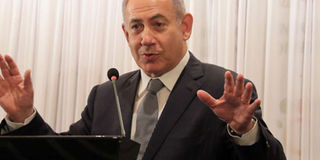Why Israeli PM Netanyahu was eager to visit Kenya

Israeli Prime Minister Benjamin Netanyahu addresses Kenya Friends of Israel at Villa Rosa Kempinski Nairobi on July 5, 2016. In Kenya, Israel has been involved in agricultural and security projects. PHOTO | JEFF ANGOTE | NATION MEDIA GROUP
What you need to know:
- Most African countries broke diplomatic relations with Israel after the 1973 Yom Kippur War.
- In Kenya, the Jewish state has been helping in the construction of a wall along the Somali border to deter terrorists.
When Israeli Prime Minister Benjamin Netanyahu left Tel-Aviv on Tuesday for the inauguration ceremony of President Uhuru Kenyatta, the political import of his return to Nairobi after 16 months was not lost on observers.
Mr Netanyahu had broken the news of his Kenyan tour at a remembrance ceremony at the grave site of David Ben-Gurion, the founder of the State of Israel and bosom supporter of Kenya’s independence struggle.
Then, Mr Netanyahu spoke of Ben-Gurion’s foreign policy doctrine of establishing strong ties with friendly nations.
RELATIONS
That he chose to be the only non-African leader to make it to Nairobi — in spite of his Shin Bet security service special agents warning him not to attend the open ceremony at Kasarani — was a diplomatic triumph for President Kenyatta as he began his second and final term.
This is Mr Netanyahu’s third visit to Africa in the past year and a half as he seeks to solidify relations with the continent and as Israel seeks to position itself on the international arena.
Israel has also been seeking to have African countries renounce their historical support at the United Nations for Palestinian independence and, perhaps, abstain from criticising Tel Aviv policies in the occupied territories.
UNITED NATIONS
More so, it is seeking African support in organising the Israeli-Africa summit next year and candidacy for non-permanent membership of the UN Security Council in 2018.
Ever since he took power in 2015, the four-time premier decided to pursue African nations to end the continent’s “automatic” vote against Israel at the UN.
This position was again communicated to Israeli envoys in Africa at a meeting this year in Tel Aviv.
“Africa is as high as it has ever been in the pyramid of our foreign policy interests — except, perhaps, in the 1960s,” Mr Netanyahu was quoted as saying.
“The first interest is to dramatically change the situation regarding African votes at the UN and other international bodies from opposition to support.
“There are 54 countries in Africa; we want to erode the opposition and change it to support.”
WAR
That he flew to Nairobi, where he would meet the various African heads of state and government present, meant that Israelis are serious about their place in Africa and to restore relations damaged by the 1967 Six Day War that led to the occupation of the Sinai and the West Bank.
Most African countries broke diplomatic relations with Israel after the 1973 Yom Kippur War, ending the engagement foreign policy crafted by former foreign ministers Golda Meir and Cape Town-born Abba Eban.
With that has come some renewed push by Israel to finance security and development projects in various African countries, coupled with technical support.
TERROR ATTACKS
In Kenya, Israel has been involved in agricultural and security projects.
It has also been giving Kenya intelligence reports to avert terror attacks.
Israeli security agencies are considered the best in the world with Mossad, the national intelligence agency, known for its skills in intelligence collection, counter-terrorism and covert operations.
TRAVEL
In 2016, exports of arms and military technology from Israel to Africa amounted to $275 million, which was 4.2 per cent of total Israeli arms exports.
In Kenya, the Jewish state has been helping in the construction of a wall along the Somali border to deter terrorists.
Kenya also has other agreements with Israel covering health and immigration.
During Mr Netanyahu’s last visit, he struck a deal that allowed diplomatic passport holders from Kenya, top Kenyan government officials and prominent personalities to freely travel to Israel.
ENTEBBE RAID
Mr Netanyahu has a soft spot for Kenya because of the assistance that the country gave Israel during the July 3, 1976 rescue of its citizens who had been detained by then-Ugandan President Idi Amin after a France airliner was hijacked and commandeered to Entebbe.
The PM openly acknowledged Kenya’s assistance, saying it “dealt a devastating blow to international terrorism.
“Kenya is special,” he said.
Unfortunately, Mr Netanyahu’s brother, Lt-Col Yonatan Netanyahu, who led the Operation Thunderbolt mission, was killed during the military operation.





